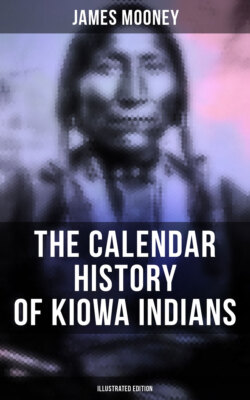Читать книгу The Calendar History of Kiowa Indians (Illustrated Edition) - James Mooney - Страница 51
На сайте Литреса книга снята с продажи.
Indian War on the Plains, 1864
ОглавлениеTable of Contents
The chronic raiding still continued. In 1860 the troops had been ordered to chastise the Kiowa and Comanche, but apparently with little effect. Then came the rebellion, involving all the civilized and partly civilized tribes of the south and reacting on the wild tribes of the plains. At the same time the fugitive hostiles from the Sioux war in Minnesota in 1862, who had taken refuge with their western brethren of the same tribe, helped to increase the ferment. There is evidence also that agents of the Confederacy had something to do with this result. In the fall of 1863 it was learned that a combination had been formed by the Dakota, Cheyenne, part of the Arapaho, the Kiowa, Comanche, and Apache—all the principal fighting tribes—to inaugurate a general war along the plains in the spring. To meet the emergency, messages were sent out to the different tribes in June, 1864, directing all friendly Indians to repair at once to certain designated military posts, with a warning that all found away from these posts after a certain date would be considered hostile. As it was difficult for troops to distinguish one tribe from another, an order was issued at the same time prohibiting the friendly Indians in eastern Kansas from going out on their usual buffalo hunt upon the plains.
Only a part of the Arapaho, and later some of the Cheyenne, responded and came in. After waiting a sufficient time, Governor Evans of Colorado issued a proclamation in the summer of 1864 designating all Indians remaining out as hostiles, whom all persons were authorized to kill and destroy as enemies of the country, wherever they might be found (Report, 9). In August the agent at Fort Lyon, Colorado, for the Kiowa, Comanche, Apache, Cheyenne, and Arapaho, wrote that "the orders are to kill every Indian found in the country, and I am inclined to assist in carrying the orders into effect" (Report, 10).
The official reports covering the summer of 1864 are full of notices of murders and depredations on the plains. The agent of the Overland Mail stated in August that as a consequence the company had been compelled to abandon all its stations for a distance of 400 miles, while every ranch within the same section had been deserted. He reported that the Indians "arrogantly declare that the land belongs exclusively to them; they intend to regain and hold it if they have to destroy every white man, woman, and child to accomplish their purpose. It would seem that the recent enormous emigration across the plains has alarmed many of the tribes and infused into their rude minds the belief that the whites were about to take possession of their country" (Report, 11). The great emigration referred to was in consequence of the rush to the gold mines of Pike's Peak, discovered in 1858.
